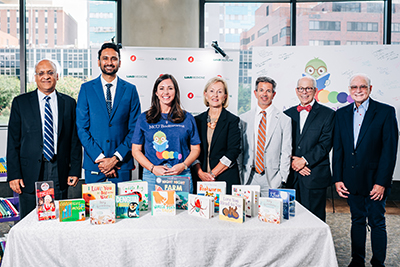 L to R: Anupam Agarwal, M.D., dean of the Heersink School of Medicine, Viral Jain, M.D., creator of the NICU Bookworm program, Senator Katie Britt, Dawn Bulgarella,MSHA, CPA, CEO of the UAB Health System, Brian Massey, government relations at Children's of Alabama, Mitch Cohen, M.D., chair of the Department of Pediatrics, and Wally Carlo, M.D., co-director of the Division of NeonatologyEarly child literacy is an important factor in the development of children setting them up for success in the future. Research has shown that reading and language deficits in a child are fixed by two years of age, so early intervention is crucial, especially for premature and sick newborns who are at a higher risk of neurodevelopmental deficits, including in language and reading.
L to R: Anupam Agarwal, M.D., dean of the Heersink School of Medicine, Viral Jain, M.D., creator of the NICU Bookworm program, Senator Katie Britt, Dawn Bulgarella,MSHA, CPA, CEO of the UAB Health System, Brian Massey, government relations at Children's of Alabama, Mitch Cohen, M.D., chair of the Department of Pediatrics, and Wally Carlo, M.D., co-director of the Division of NeonatologyEarly child literacy is an important factor in the development of children setting them up for success in the future. Research has shown that reading and language deficits in a child are fixed by two years of age, so early intervention is crucial, especially for premature and sick newborns who are at a higher risk of neurodevelopmental deficits, including in language and reading.
Viral Jain, M.D., assistant professor in the Division of Neonatology, created the NICU Bookworm reading program in 2021 to reduce developmental deficiencies and increase parent-infant bonding for infants who are in the Regional Neonatal Intensive Care Unit (RNICU) and Continuing Care Nursery (CCN) at the Women’s and Infants Center and the NICU at Children’s of Alabama.
“Many of our parents are not aware of the benefits of reading to their child,” said Jain. “That is where the Bookworm program comes in.”
To celebrate the Bookworm program and promote the importance of early child literacy and parent-infant bonding, UAB Medicine and Children’s of Alabama hosted the annual Bookworm Day on Monday, Aug. 19.
At this year’s event, Senator Katie Britt joined to tour the UAB RNICU and Children’s of Alabama NICU to learn about the program and read to some of the smallest patients. In previous years Mayor Randall Woodfin and Representative Terri Sewell have attended the event.
“It is important that we advocate for shared reading soon after birth,” said Jain. “Support can immensely impact parents. It can help them access books. It can help provide guidance.”
The Bookworm reading program encourages parents of children in the NICU to read with their infant and provides books for the family to start building their libraries. The goal of the program is to provide families with books to read to their child while they are in the NICU or RNICU to increase parent-infant bonding and expose the babies to new words through reading.
Preterm and sick newborns lack a significant amount of human sound exposure needed to help their brains develop during this period of rapid brain growth. They have a harder time reacting to external stimulation while maintaining stability in bodily systems, which can cause them to become overstimulated and stressed. Reading provides positive auditory stimulation for these babies.
“Since many of the babies in the NICU are here for months, we use the opportunity to coach the parents on the benefits of book sharing,” said Jain. “The program has led to parents reading more frequently to their babies, enhanced parent-infant bonding, and reduced parent stress levels – all predicters of healthy child development.”
“NICUs can be stressful for infants and families, and we have seen how parents are sometimes less likely to hold, feed, and talk to their babies in that environment. Reading can be a key step in solving that problem.”
Every time a parent reads to their infant, they receive a decorative circle that is then placed on each infant’s door and help build a “bookworm.”
Families are given books daily as part of the program. Sandra Milstead, family nurse liaison in the UAB Women and Infants Center, and Yvonne Bolaji, clinical research coordinator, oversee the book distribution. The hand-delivery process was limiting parents time and opportunity to read new books. This was solved last year with the donation of a book vending machine.
Parents earn tokens through participating in care of their infant and education programs; they can use the tokens to get a new book from the vending machine.
“We hope we can continue to invest in our young Alabamians and set them up for success in their future and the future of the state,” said Jain
Books for the NICU Bookworms program were donated by Reach Out and Read-Alabama and by Legacy Federal Credit Union. To donate new books to the program, visit the UAB RNICU Wishlist. Want to make an additional gift? Donate to the UAB RNICU and CCN here.